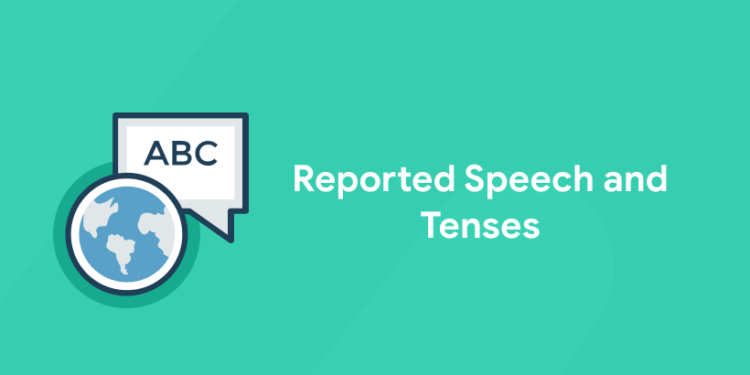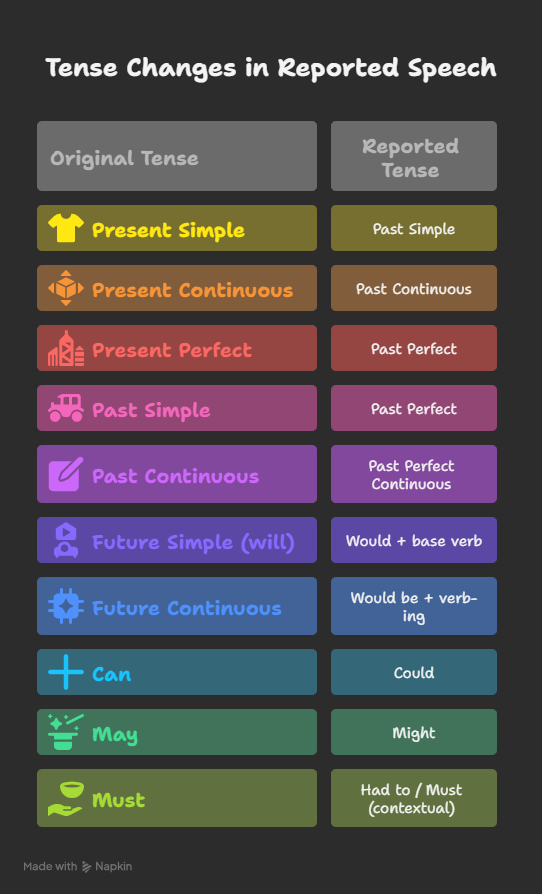Table of Contents
Are you someone learning English as a second language? Or are you brushing up on your grammar knowledge for academic and professional purposes? Whatever your situation may be, learning how to accurately report what others said to you is an essential skill for effective communication. Reported speech and tenses are an essential part of English grammar. Reported speech or indirect speech plays a major role in many kinds of communication. Such as:
- Storytelling
- News reporting
- Business communication
- Everyday conversation
But it might not be as easy as it sounds. Many learners, even the ones with many years of experience, may face confusion on how to correctly change tenses, pronouns, and sentence structure. In this blog, we will try to understand reported speech with clear rules, tense changes, types, and examples.
Master converting direct to indirect speech with ease! Join the Entri Spoken English course!
Reported Speech and Tenses: Introduction
Effective communication is impossible if we don’t have the ability to share what others have said. This is where reported speech comes into play. Reported speech is an important component of English grammar. It allows us to share information from other conversations without exactly quoting them. There are many changes a normal sentence undergoes when turning into reported speech. Understanding these tense changes is very important when it comes to speaking as well as writing. In this blog, we will explore the basics of reported speech, its types, tense transformations, and practical examples to help you master it with confidence.
What is Reported Speech?
1: Which of the sentences below is grammatically correct?
Reported speech is also known as indirect speech. It is the way in which we express what someone else said without having to quote the exact words said by them. Direct speech is exactly the opposite of this. In this, we quote the speaker verbatim. Look at the table below.
| Type | Direct Speech | Indirect (Reported) Speech |
| Statement | She said, “I like music.” | She said (that) she liked music. |
| Yes/No Question | He asked, “Do you play chess?” | He asked if I played chess. |
| Wh- Question | Sara asked, “Where is my bag?” | Sara asked where her bag was. |
| Command | Dad said, “Clean your room.” | Dad told me to clean my room. |
| Request | John said, “Please call me.” | John asked me to call him. |
| Suggestion | Emma said, “Let’s try again.” | Emma suggested trying again. |
| Offer | Tom said, “Shall I drive you?” | Tom offered to drive me. |
| Promise | She said, “I will return soon.” | She promised to return soon. |
| Negative Command | He said, “Don’t be late.” | He told me not to be late. |
| Present Tense (No Backshift) | Lisa says, “I love pizza.” | Lisa says (that) she loves pizza. |
Reported speech is commonly used in everyday conversation, journalism, academic writing, and storytelling to relay messages clearly and concisely.
Spoken English Course for Guaranteed Confidence and Career Growth
Spoken English Course by Entri App: Enhance your communication skills, gain certification, and boost your career with confidence.
Join Now!Types of Reported Speech
Various types of reported speech are discussed in the table.
| Type | Direct Speech | Reported Speech | Reporting Verb Examples |
| Statement | She said, “I am tired.” | She said (that) she was tired. |
|
| Yes/No Question | He asked, “Are you coming?” | He asked if/whether I was coming. |
|
| Wh- Question | She asked, “Where do you live?” | She asked where I lived. |
|
| Command | He said, “Close the door.” | He told me to close the door. |
|
| Request | She said, “Please help me.” | She asked me to help her. |
|
| Suggestion | He said, “Let’s go to the park.” | He suggested going to the park. |
|
| Offer | He said, “Shall I carry your bag?” | He offered to carry my bag. |
|
| Promise | She said, “I will help you.” | She promised to help me. |
|
Rules for Converting Direct to Indirect Speech
Many grammatical adjustments are necessary when changing direct speech into indirect speech. They are discussed below.
Remove Quotation Marks
The first point to remember when converting direct speech to indirect speech is that quotation marks are not used in reported speech.
| Free PDFs for download | |
Change in Pronouns
Another key change that happened when direct speech changes to reported speech is the changes in pronouns. Look at the examples given below.
| Direct Speech | Reported Speech | Explanation |
| She said, “I like your dress.” | She said (that) she liked my dress. | “I” → “she”
“your” → “my” |
| He said, “I will help you.” | He said (that) he would help me. | “I” → “he”
“you” → “me” |
| They said, “We enjoyed our trip.” | They said (that) they had enjoyed their trip. | “We” → “they”
“our” → “their” |
| He said, “She is my sister.” | He said (that) she was his sister. | “my” → “his” |
| I said to him, “I like your idea.” | I told him (that) I liked his idea. | “your” → “his” |
Some key pronoun changes that happen during the shift from direct to reported speech are given below.
| Direct | Reported |
| I | he / she |
| you | I / we / he / she / they (depends on speaker-listener) |
| we | they |
| my | his / her / my (depends) |
| your | my / our / his / her / their |
| our | their |
| me | him / her / me |
| us | them |
Adjust Time and Place Words
The next thing you have to keep in mind is that words indicating time and place are required to be adjusted while converting from direct to indirect speech.
| Direct Speech | Indirect Speech |
| now | then |
| today | that day |
| yesterday | the day before |
| tomorrow | the next day |
| here | there |
| this | that |
Change the Tense (If needed)
Tense changes are also something that occurs when a sentence changes from direct to reported speech. But this section needs a much more detailed explanation. We will give exactly that in the next section.
Tense Changes in Reported Speech
The tense of the verb changes when direct speech is converted to reported speech. Let us look at some instances.
General Rule: Backshift the Tense
The tense of the verb changes when direct speech is converted to reported speech if the verb is in the past tense. This change is usually known as backshifting. This is because the event in question or the verb is being reported after it happened. How the tense shift happens is shown in the table below.
| Direct Speech Tense | Reported Speech |
| Present Simple | Past Simple |
| Present Continuous | Past Continuous |
| Present Perfect | Past Perfect |
| Past Simple | Past Perfect |
| Past Continuous | Past Perfect Continuous |
| Future Simple (will) | Would + base verb |
| Future Continuous | Would be + verb-ing |
| Can | Could |
| May | Might |
| Must | Had to / Must (contextual) |
Some examples that would help you understand the case better are given below.
| Direct Speech | Reported Speech |
| “I work hard.” | She said she worked hard. |
| “I am studying.” | He said he was studying. |
| “I have finished.” | She said she had finished. |
| “I lost my keys.” | He said he had lost his keys. |
| “I was driving.” | She said she had been driving. |
| “I will go.” | He said he would go. |
| “I will be staying.” | She said she would be staying. |
| “I can help.” | He said he could help. |
| “I may come.” | She said she might come. |
| “I must leave.” | He said he had to leave. |
No Tense Change (When Not to Backshift)
As we said above, backshift is the general rule. But there are instances in which backshifting is not needed. Take a look at the table given below.
| Condition | Direct Speech | Reported Speech | Explanation |
| The reporting verb is in the present tense | “I like tea.” | She says (that) she likes tea. | No backshift because the reporting verb is in the present. |
| The statement is a universal truth or fact | “The sun rises in the east.” | He said the sun rises in the east. | No backshift because it’s still true. |
| Talking about a recent or future event that hasn’t changed | “I’m going to the party tonight.” | She said she is going to the party tonight. | No backshift because the plan is still valid. |
Time and Place Changes
Time expressions also change along with tenses in reported speech. Look at the table below.
| Direct Speech | Indirect Speech |
| today | that day |
| yesterday | the day before |
| tomorrow | the next/following day |
| now | then |
| here | there |
| this | that |
Some examples are provided in the table below so that you can comprehend this shit in time expression in real conversation scenarios.
| Direct Speech | Indirect Speech |
| I’m busy today | He said he was busy that day. |
| I met her yesterday | She said she had met her the day before. |
| I’ll go tomorrow | He said he would go the next day. |
| I need it now. | She said she needed it then. |
| I’m staying here. | He said he was staying there. |
| This is hard. | She said that was hard. |
Quick Tips for Handling Reported Speech and Tenses
Some tips to keep in mind to help you learn and handle the reported speech section more easily are given below.
- Always check the reporting verb. If it’s in the past, backshift.
- If the sentence is a general truth, fact, or still relevant, the tense may not change.
- Pronouns and time expressions often need to change, too.
- Questions, commands, and requests follow different rules — not just tense but also structure.
You can learn all these tips from expert mentors if you join an online spoken English class. Many of them might not provide grammar lessons. But the Entri spoken English course is not one among them. They place much importance on grammar in their curriculum.
Click here to get more information on the Entri Spoken English class! Register now to join!
Spoken English Course for Guaranteed Confidence and Career Growth
Spoken English Course by Entri App: Enhance your communication skills, gain certification, and boost your career with confidence.
Join Now!Practice Examples with Answers
Some practice examples along with an answer key are provided in this section. As the wise say, practice makes a man perfect. So let us practise some Reported Speech and Tenses exercises!
- Sarah said, “I enjoy cooking.”
- John said, “I am watching a movie.”
- She said, “I have completed the project.”
- He said, “I went to the dentist yesterday.”
- Anna said, “I was reading a novel.”
- Tom said, “I will call you tomorrow.”
- They said, “We will be arriving late.”
- Mark said, “I can fix the computer.”
- Lisa said, “I may visit you next week.”
- The teacher said, “You must submit your homework.
Answers
Have you finished doing the Reported Speech and Tenses question above? Then it is time to cross-check your answers with the right ones now. Let us go!
- Sarah said (that) she enjoyed cooking.
- John said (that) he was watching a movie.
- She said (that) she had completed the project.
- He said (that) he had gone to the dentist the day before.
- Anna said (that) she had been reading a novel.
- Tom said (that) he would call me the next day.
- They said (that) they would be arriving late.
- Mark said (that) he could fix the computer.
- Lisa said (that) she might visit me the following week.
- The teacher said (that) I had to submit my homework.
Click here to learn Reported speech and Tenses from experts! Join the Entri English course now!
Reported Speech and Tenses: Conclusion
It is not easy to master reported speech and tense shifts that are associated with it. But they are super essential for good communication in English. Understanding how to convert a direct speech into reported form with grammatical accuracy and fluency is important in many situations, such as:
- Writing a report
- Narrating an event
- Relaying a message
They might seem complicated at first glance, but they become easier the more you practise. So read the rules in the blog and find more practice exercises to improve your comprehension of the subject.
Spoken English Course for Guaranteed Confidence and Career Growth
Spoken English Course by Entri App: Enhance your communication skills, gain certification, and boost your career with confidence.
Join Now!Frequently Asked Questions
How are modal verbs treated in reported speech?
Some modal verbs change:
- can → could
- will → would
- may → might
- However, others, like must, may remain the same or change depending on context.
What happens with questions in reported speech?
Questions are reported using the question word or “if/whether,” and the word order changes to a statement form.
- Direct: She asked, “Are you coming?”
- Indirect: She asked if I was coming.
Can I omit "that" in reported speech?
Yes. In informal speech or writing, “that” is often omitted. For example, take the sentence “He said (that) he was tired.”
Do I always need to change the tense in reported speech?
No. If the reporting verb is in the present tense, you do not need to change the tense of the original sentence.










